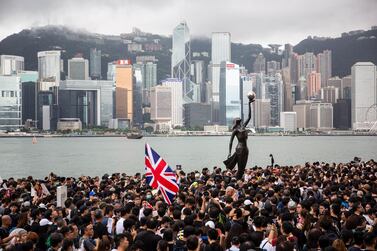Hong Kong protest leaders said on Tuesday that demonstrations would continue, despite Chief Executive Carrie Lam declaring that efforts to revive the extradition bill were “dead”.
Ms Lam once again stopped short of saying the bill had been withdrawn, but said work on the proposed law had been a “total failure”.
Hundreds of thousands have taken part in protests over the past month, concerned that civil rights in the semi-autonomous Chinese territory are being slowly eroded.
The demonstrators say the civil disobedience will continue until the bill is formally withdrawn and an investigation into the heavy-handed tactics used by police against protesters is opened.
“We cannot find the word ‘dead’ in any of the laws in Hong Kong or in any legal proceedings in the Legislative Council,” protest leaders Jimmy Sham and Bonnie Leung said in a statement.
“So how can the government tell us that we should preserve our rule of law, when [Lam] herself does not use the principle of the rule of law?”
Details about future protest actions will be announced at a later time, Mr Leung said.
Lam acknowledged at a news conference earlier on Tuesday that there were “lingering doubts about the government’s sincerity or worries about whether it would seek to bring the legislation back for a vote”. But she said: “I reiterate here, there is no such plan. The bill is dead.”
Protests against the proposed extradition legislation have given voice to fears that Hong Kong is losing the freedoms guaranteed to the former British colony when it was returned to China in 1997.
The legislation would allow criminal suspects to be extradited to mainland China. Critics fear suspects would face unfair and politicised trials, and that opponents of China’s ruling Communist Party would become targets.
Hong Kong activist Denise Ho gave a speech to the United Nations rights council on Monday that was twice interrupted by a Chinese diplomat.
Ms Ho, a pro-democracy pop singer, has joined the huge marches of protesters calling for democratic reforms and a halt to sliding freedoms in the semi-autonomous city.
She condemned the now-suspended extradition legislation, which triggered the worst crisis in Hong Kong’s recent history.
“Will the United Nations convene an urgent session to protect the people of Hong Kong?” she asked council members, insisting that freedoms in the territory were “under serious attack”.
Ms Ho’s speech was twice interrupted by the first secretary at the Chinese mission, Dai Demao, who raised points of order – a procedure member states use when they feel a speaker has breached UN rules.
He said Ms Ho’s equating of Hong Kong with China, rather than referring to Hong Kong as part of China, was an “affront” to Beijing.
The Chinese military commander responsible for Hong Kong on Tuesday assured the United States that Chinese troops would not interfere in the city’s affairs – an apparent signal they would stay in their barracks amid renewed political upheaval.
Ms Lam apologised last month for the proposed bill, which was seen as favouring China.
“I personally have to shoulder much of the responsibility,” Ms Lam said. “I offer my most sincere apologies to all people in Hong Kong.”
Despite calls for her resignation from protesters, Ms Lam has declined to step down, yet activists have rejected her expressions of regret.
The dispute has attracted global attention to the embarrassment of China, which has blamed foreigners for provoking the protests and urged other nations to stop becoming involved in what it regards as a domestic issue.
Critics of the proposed extradition bill, which is backed by Beijing, fear it will leave people vulnerable to China’s notoriously opaque courts system. But the Hong Kong government argued it would “plug the loopholes” it says make the city a safe haven for criminals.
The business hub is anxious over the increasingly authoritarian Communist rule of Chinese President Xi Jinping.






